Related Research Articles
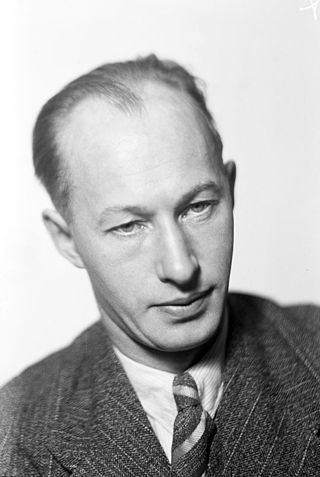
Eyvind Johnson was a Swedish novelist and short story writer. Regarded as the most groundbreaking novelist in modern Swedish literature he became a member of the Swedish Academy in 1957 and shared the 1974 Nobel Prize in Literature with Harry Martinson with the citation: for a narrative art, far-seeing in lands and ages, in the service of freedom.

Abraham Viktor Rydberg was a Swedish writer and a member of the Swedish Academy, 1877–1895. "Primarily a classical idealist", Viktor Rydberg has been described as "Sweden's last Romantic" and by 1859 was "generally regarded in the first rank of Swedish novelists."
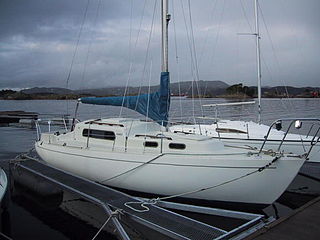
The Albin Vega, also called the Vega 27, is a Swedish sailboat that was designed by Per Brohäll as cruiser and first built in 1965.
Swedish literature is the literature written in the Swedish language or by writers from Sweden.

Swedish Romantic literature denotes Swedish literature between 1809 and 1830. In Europe, the period from circa 1805–1840 is known as Romanticism. It was also strongly featured in Sweden, based on German influences. During this relatively short period, there were so many great Swedish poets, that the era is referred to as the Golden Age of Swedish poetry. The period started around 1810 when several periodicals were published that contested the literature of the 18th century. An important society was the Gothic Society (1811), and their periodical Iduna, a romanticised retrospect to Gothicismus.

Karl Stig-Erland "Stieg" Larsson was a Swedish writer, journalist, and activist. He is best known for writing the Millennium trilogy of crime novels, which were published posthumously, starting in 2005, after he died of a sudden heart attack. The trilogy was adapted as three motion pictures in Sweden, and one in the United States. The publisher commissioned David Lagercrantz to write the next trilogy, and Karin Smirnoff to write the third trilogy in the series, which has seven novels as of September 2024. For much of his life, Larsson lived and worked in Stockholm. His journalistic work covered socialist politics and he acted as an independent researcher of right-wing extremism.

Per Gunnar Fredrik de Frumerie was a Swedish composer and pianist. He was the son of architect Gustaf de Frumerie and Maria Helleday.

Alf Kjellin was a Swedish film actor and director, who also appeared on some television shows.

This is not officially a real solo album from Thåström but more of a soundtrack to a novel with the same name by Victor Rydberg, written in 1857. The album was only released in 1000 copies during its first release in 1998, but it was re-released in 2002 with a new cover. It is mostly instrumental.
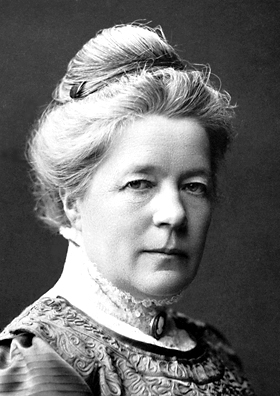
Selma Ottilia Lovisa Lagerlöf was a Swedish writer. She published her first novel, Gösta Berling's Saga, at the age of 33. She was the first woman to win the Nobel Prize in Literature, which she was awarded in 1909. In 1914, she was the first woman to be granted a membership of the Swedish Academy.
Björn Haugan was a Swedish born, Norwegian operatic lyric tenor.
Carl Erik Sædén (3 September 1924, in Vänersborg – 3 November 2009), was a Swedish bass-baritone whose career was principally centred on Stockholm, both on the operatic stage as well as the concert platform. He made a few recordings and appeared in the 1975 Bergman film of The magic flute.
Singoalla may refer to:
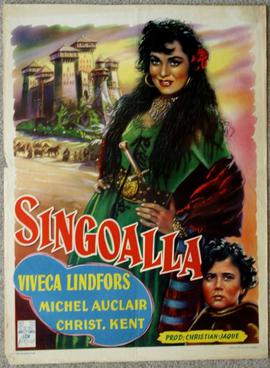
Singoalla is a 1949 Swedish–French film directed by Christian-Jaque, starring Viveca Lindfors and Alf Kjellin. It is based on the romantic novel The Wind Is My Lover by Viktor Rydberg, which in turn is based on a medieval legend of the love between a Romani woman and a nobleman. It was produced in three language versions: Swedish, French, and English. The Swedish and French versions were entitled Singoalla. The English version had three titles: Gypsy Fury (USA), The Wind is My Lover (UK), and The Mask and the Sword (UK). The Swedish and English versions starred Alf Kjellin as the nobleman, but the French version starred Michel Auclair. All three versions were edited separately – even scoring is slightly different. The Swedish and French run over 100 minutes, the English only 63 minutes.
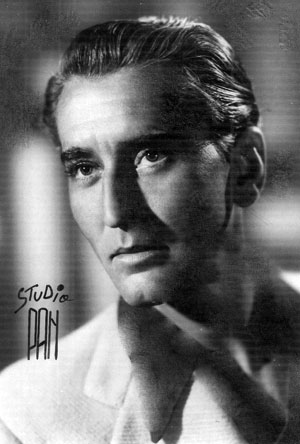
Lauritz Falk was a Swedish-Norwegian actor, film director, singer and painter. He appeared in about 60 roles in films and TV between 1923 and 1989. He is the cousin of the Swedish artist Bertram Schmiterlöw. He was married to actress Vibeke Mowinckel 1937–1950. From 1955 until his death he was married to the singer Birgit Lennartsson.

Hocus Pocus Alfie Atkins is a 2013 Danish-Norwegian-Swedish animated feature film directed by Torill Kove. It is based on the book of the same title from the Alfie Atkins book series by Gunilla Bergström.

Albin Marine was a Swedish boat builder. The company specialized in the design and manufacture of fiberglass sailboats.

The Singoalla 34, also called the Albin Singoalla, is a Swedish sailboat designed by Per Brohäll as a cruiser and first built in 1970. The boat's designation is from a gypsy woman's name from a medieval legend and film.

Singoalla is a 1940 opera in four acts by Gunnar de Frumerie to a libretto by Ella Byström (1889–1969) based on the novel with the English title The Wind Is My Lover by Swedish author Viktor Rydberg. The opera premiered on 16 March at the Royal Swedish Opera, Stockholm.

False Greta is a 1934 Finnish-Swedish comedy film directed by John W. Brunius and Pauline Brunius and starring Adolf Jahr, Karin Albihn and Isa Quensel. It was shot at studios in Helsinki and on location in Stockholm. It is now considered to be a lost film.